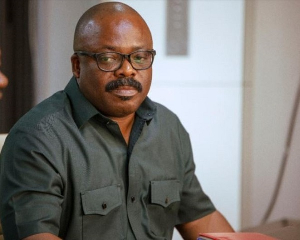Mr Edetaen Ojo, the Board Chairman of the Media Foundation for West Africa (MFWA), has called for the strengthening of the media in order to promote democratic governance in Africa.
He said West Africa presents a diverse and complex political environment which has severely impacted on the media landscape.
He said although there were thousands of media institutions in the region, most of them were weak and, in some cases, on the decline while the entire sector was plagued by a range of challenges that raise serious questions about their sustainability and capacity to play an effective role in democratic governance.
Mr Ojo made the appeal on Friday at opening of the West Africa Media Excellence and Awards (WAMECA) 2018 in Accra.
“There is no doubt that support for the media is essential in order to strengthen it to play a more effective role in ensuring transparent and accountable governance, as well as addressing many other socio-economic issues such as poverty, exposing corruption and supporting post-conflict re-construction in some countries in the region,” he said.
“A media system that is weak or lacking in independence and professionalism cannot play a positive role in development. It would be vulnerable and therefore easily taken over or co-opted by partisan or sectarian interest and manipulated for undemocratic purposes,” he said.
The conference brings together key personalities, organisations (local, regional and international), media practitioners, academia, activists and civil society organisations to reflect on the trends and challenges in the areas of free expression, media development and access to information.
The WAMECA awards on the other hand is meant to reward and inspire media excellence in West Africa, as well as honour West African journalists who have produced works that are impacting lives and societies positively.
Mr Ojo said, however, the challenges that the media sector faces vary in character and degree in different countries across the region; stating that developing an effective response through policy intervention requires an accurate and thorough understanding of the nature of these challenges as well their consequences.
He said it was partly for these reasons that the MFWA, with the support from the Centre for International Media Assistance (CIMA), embarked on consultative, multi-stakeholder research undertaking to identify common challenges facing the media across the region, to define policy priorities and outline a strategy for future regional media development work.
Mr Sulemana Braimah, the Executive Director, MFWA, said the last two decades has witnessed significant growth in the media industry in West Africa thanks to the transition to democratic governance and the ever increasing access to the internet; declaring that fortunately governments no longer has monopoly over media ownership and control.
“The growth of the media industry obviously presents a great opportunity for the consolidation of the nascent democracy in the region,” he said.
“Such vibrant, pluralistic media landscape is what is required for fostering good governance and for promoting the wellbeing of the citizenry.”
Nana Kwasi Gyan-Apenteng, the Chairman of the National Media Commission, said the WAMECA was of massive significance in the media development history of the West African sub-region.
He said WAMECA establishes MFWA even more firmly as one of the important media institutions not only in Africa but also in the world.
Nana Gyan-Apenteng called for quality delivery in the media activities in Africa.
Mr Paul Rothman, Assistant Partnership Officer, CIMA, said as part of efforts to better understand the challenges facing independent media and media systems across the world, and to help generate more locally informed ideas about what needs to be done, CIMA and its partners at Deutsche Welle Akademie, have been working with local partners to convene a series of regional consultations around the world to identify key challenges facing media systems and to develop regional strategies for addressing them.
Madam Hawa Ba, Senegal Country Officer, Open Society Initiative for West Africa (OSIWA) acknowledged the media’s role in promoting democratic governance.
She said despite the gains in strengthening the media, the media landscape remains fragile in West Africa and that its future is still uncertain.
Mr Roberto Quiroz, Public Affairs Officer, United States Embassy in Ghana, said the US supports freedom of the press across the world, because it promotes democratic governance.
General News of Saturday, 13 October 2018
Source: ghananewsagency.org
MFWA calls for strengthening of the media to promote democratic governance
Entertainment












